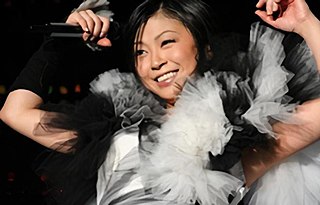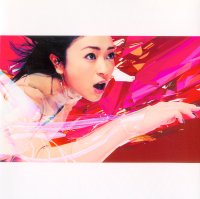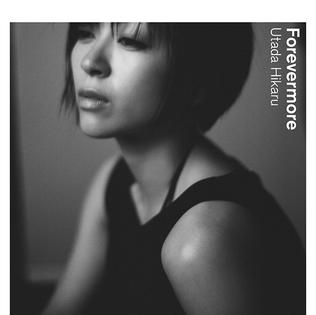
Hikaru Utada, also known mononymously as Utada, is a Japanese and American singer, songwriter and producer. Utada is considered to be one of the most influential, bestselling musical artists in Japan.

First Love is the debut Japanese-language studio album by Japanese-American recording artist Hikaru Utada, released on March 10, 1999, by Toshiba-EMI.

Exodus is the second English-language album by Japanese-American singer-songwriter Hikaru Utada, released on September 8, 2004 by Island Records under the moniker Utada. Her first English-language album called Precious was released under the name "Cubic U". After being discovered in North America by Island CEO Lyon Cohen when she contributed to the Rush Hour 2 soundtrack, he was very interested in signing Utada to his record label and she eventually accepted the offer. She traveled to Los Angeles to sign the contract and began recording the studio album straight after her signing. However, during the time frame from 2002 to 2003, Utada was diagnosed with a benign ovarian tumour that needed surgery and treatment. She also married her then-husband Kazuaki Kiriya, which stopped recording temporarily.

"You Make Me Want to Be a Man" is a song recorded by Japanese recording artist Utada for her fifth studio album and second English album, Exodus (2004). It was written and produced by Utada, with co-production by her father Teruzane Utada. The track was inspired by her relationship with her husband at the time, Kazuaki Kiriya. Its themes include sexism and understanding each other from a different perspective. "You Make Me Want to Be a Man" premiered on January 1, 2005 as the fourth and final single from the album. Self-described as an electronic and dance-pop song, it contains numerous elements including J-pop and techno.

"Exodus '04" is the 3rd English single by Utada and written by herself and Timbaland. It was released on June 21, 2005. It hit #24 on the Billboard Hot Dance/Club Airplay chart. Similarly to that of "Devil Inside," no music video was produced.

"Hikari" is a song recorded by Japanese–American recording artist Hikaru Utada for her fourth studio and third Japanese language album, Deep River (2002). It premiered on March 20, 2002, as the third single from the album in Japan. It was written and composed by Utada, whilst production and arrangement was handled by Utada, her father Teruzane Utada, and long-time collaborator Miyake Akira. The single, and a remix by Russell McNamara, was used as the official Japanese theme song for the 2002 action role-playing video game Kingdom Hearts, and appeared on its original soundtrack respectively. Musically, "Hikari" is a pop folk song. Lyrically, it is about mysteries in life and human activities.

"Traveling" is a song recorded by Japanese–American recording artist Hikaru Utada. It was released as the second single from her fourth studio and third Japanese language album, Deep River (2002). The track was written and composed by Utada, whilst production was handled by Utada, her father Teruzane Utada, and long-time collaborator Akira Miyake. Musically, "Traveling" is a dance-pop song, influenced by house music. Lyrically, it discusses human activities and dreams.

"Wait & See (Risk)" is a song recorded by Japanese–American singer Hikaru Utada for her third studio and second Japanese language album, Distance (2001). It was released on April 19, 2000 as the second single from the album in Japan. It was written and composed by Utada, whilst production and arrangement was handled by Utada and American duo Jimmy Jam & Terry Lewis. The single also included the two B-side tracks, "Hayatochiri" and "Fly Me to the Moon ", with the former song appearing on the parent album. Musically, "Wait & See (Risk)" is an R&B song, influenced by dance-pop and rock.

"Addicted to You" is a song by Japanese-American recording artist Hikaru Utada from her second studio album Distance (2001). It was released as the album's lead single on November 10, 1999 by EMI Music Japan. "Addicted to You" was written by Utada and produced by Jimmy Jam & Terry Lewis; this is Utada's first collaboration with American producers and composers. The single artwork was shot by American photographer Richard Avedon and features two black-and-white figures of Utada. Musically, "Addicted to You" is an R&B song.

"Heart Station" is a song by Japanese musician Hikaru Utada, which was released as a double A-side single alongside her song "Stay Gold" on February 20, 2008. It served as the fifth single from her fifth Japanese-language album Heart Station. "Heart Station" was fully written, composed and produced by Utada herself. The song was created with the image of a song that would come on if you were to turn on your car radio on a late-night highway on your way home from work or play, with the title meaning a place that transmits radio waves from the heart. Musically, it is a midtempo pop ballad. Lyrically, it speaks about bidding someone adieu and still trying to reach them and maintain their presence in your life.

"Come Back to Me" is a pop and R&B song by Japanese American pop singer Hikaru Utada, released under the mononymous moniker Utada. The song was written by Utada and Stargate and was produced by Utada, Stargate and her father, Sking U. "Come Back to Me" is the first single from her second English-language album This Is the One. In the United States, the song has peaked at number five on the Billboard Hot Dance Club Play and number 69 on the Pop 100 chart.

"Automatic" is a song recorded by Japanese–American singer Hikaru Utada, taken as the lead single from her debut album First Love (1999). It was released on December 9, 1998, through Toshiba-EMI in three physical formats: mini CD single, standard-size CD single and 12" vinyl. Additionally, the single included the A-side "Time Will Tell", which originally served as the B-side for these versions. The song was written and co-produced by Utada, while Akira Miyake and the singer's father Teruzane Utada served as producers. Despite recording in English under the name Cubic U, "Automatic" is Utada's first Japanese recording, and was released after she enrolled into high school in Japan.

Utada Hikaru Single Collection Vol. 2 is Japanese pop singer-songwriter Hikaru Utada's second compilation album, released on November 24, 2010, by EMI Music Japan, the same day as her Universal-released English language compilation album, Utada the Best. The album includes two discs, with the first being a 13-track greatest hits album spanning 2004–2009, while the second is an extended play featuring new material. Along with Utada the Best, this remained Utada's last album release for six years, until 2016's Fantôme, due to an announced hiatus. Several of the new songs achieved commercial success, with "Goodbye Happiness" reaching number one on Billboard's Japan Hot 100 chart, and "Can't Wait 'Til Christmas" reaching number one on the Recording Industry Association of Japan's digital track chart. Both songs have been certified by the association as gold records for full-length cellphone downloads.

"Time Will Tell" is a song recorded by Japanese–American singer Hikaru Utada, taken as the lead single from her debut album First Love (1999). It was released on December 9, 1998, through Toshiba-EMI in three physical formats: mini CD single, standard CD single and 12" vinyl. Additionally, the single was originally served as a B-side to "Automatic", but was changed into an A-side. The song was written and co-produced by Utada herself, while Akira Miyake and the singer's father Teruzane Utada served as producers. Despite working recording in English under the name Cubic U, "Time Will Tell" is Utada's first Japanese recording, and was released after she enrolled into high school in Japan.

"Sakura Drops" is a song by Japanese-American musician Hikaru Utada. It was released as a double A-side single with the song "Letters" on May 9, 2002.

"Hanataba o Kimi ni" is a song by Japanese singer-songwriter Hikaru Utada. It was released digitally on April 15 2016, alongside "Manatsu no Tōriame" as joint singles for her album Fantôme. The song was the theme to the dorama Toto Neechan. The single is Utada's first release since 2012's Evangelion: 3.0 theme song "Sakura Nagashi", and marks her official comeback to the Japanese music scene.

Fantôme is the sixth Japanese studio album by Japanese-American singer-songwriter Hikaru Utada. Although Utada announced an indefinite hiatus from the public eye in August 2010, she continued writing and composing material with her father, Utada Teruzane, and long-term collaborator, Miyake Akira. Musically, Fantôme contains a collection of tracks that utilizes acoustic and stripped-down instrumentations, alongside influences of pop, electronic, and R&B music. The lyrical content delves into themes of grief, sadness, love, and death—mostly influenced by the death of her mother, her second marriage, and the birth of her son in 2015.

"Forevermore" is a song by Japanese American singer-songwriter Hikaru Utada. It is their second single under the label Epic Records, from their upcoming seventh Japanese-language studio album, Hatsukoi. The song was used as a tie-in for TBS dorama Gomen, Aishiteru, their first single used in a drama of a commercial TV station since "Eternally " in 2008. It features the renowned drummer Chris Dave.

"Face My Fears" is a song by Japanese-American singer Hikaru Utada and American DJ Skrillex. It was released on various formats by Epic and Sony Music Japan on January 18, 2019, and serves as the lead single from Utada's eleventh studio album, Bad Mode (2022). It was recorded in both English and Japanese and serves as the theme song for Square Enix's 2019 action role-playing game Kingdom Hearts III. After being approached by Square Enix to work on the video game, Utada asked Skrillex to remix "Don't Think Twice" for the game, but later decided to collaborate and create a new song.

One Last Kiss is an extended play by Japanese musician Hikaru Utada, which was released in the US on March 9, 2021. It was released for promotion of the Japanese animated film Evangelion: 3.0+1.0 Thrice Upon a Time around the time of the film's release. It contains all the previously released theme songs that were made for the Rebuild of Evangelion film series. It also contains the theme song "One Last Kiss", which was co-produced by A. G. Cook and released in conjunction with the film on March 10, 2021.




















